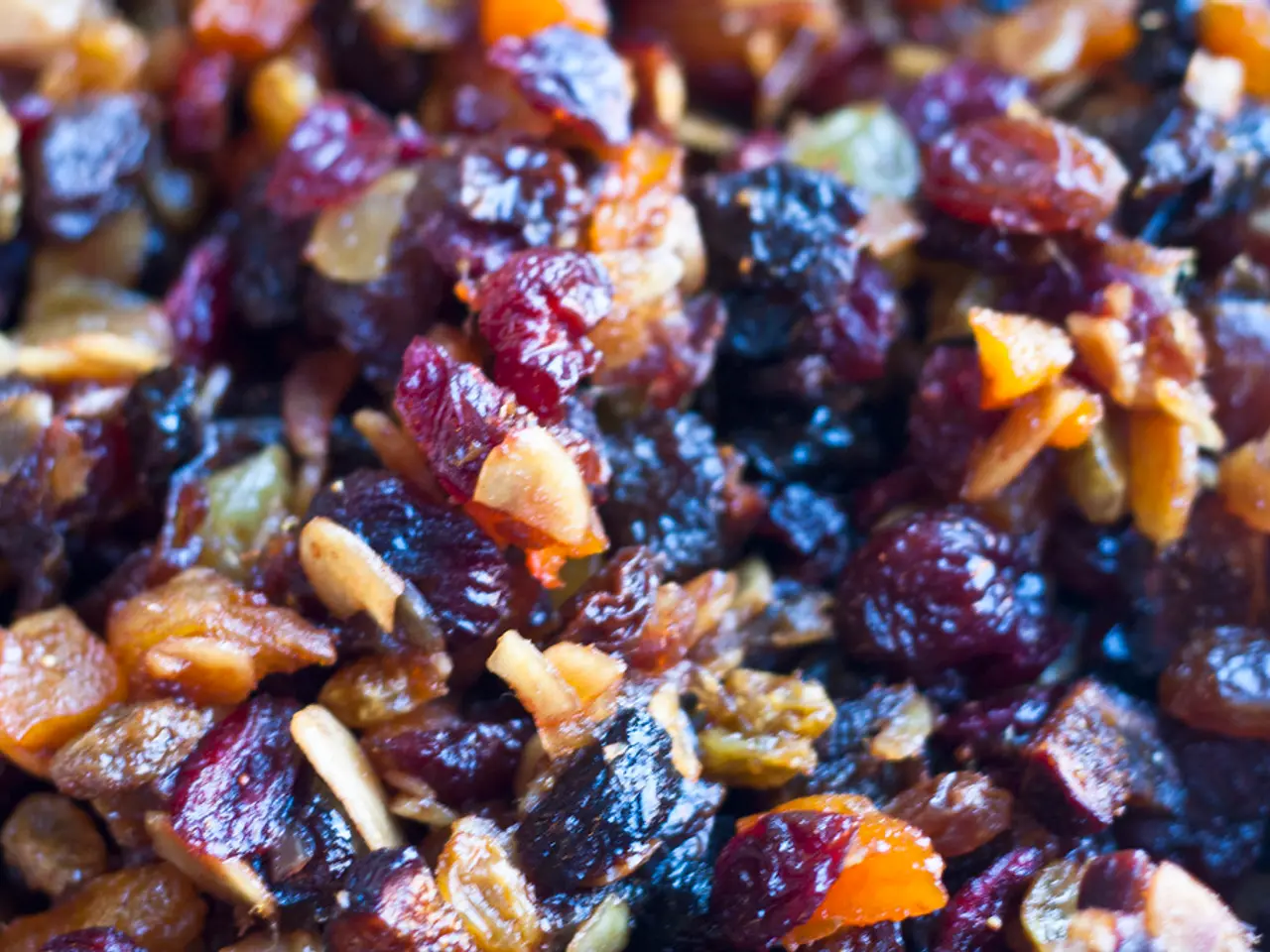Dietary strategies and suggestions for weight loss in individuals with Type 2 diabetes, plus additional information on the subject.
Type 2 diabetes can present with a variety of symptoms, including tiredness, increased thirst and urination, blurred vision, numbness or tingling in hands or feet, increased hunger, and sores that do not heal [1]. Some individuals may not discover they have diabetes until they develop complications, such as heart disease.
When it comes to managing weight, individuals with type 2 diabetes can experience weight loss, as the body may break down body fat for energy, similar to those with type 1 diabetes [2]. Effective diet tips for weight management in type 2 diabetes include sustainable energy restriction methods, focusing on balanced nutrient intake, and considering specific dietary patterns that improve blood sugar control and insulin sensitivity.
Recent research and guidelines suggest several key recommendations:
- Intermittent Energy Restriction (IER), such as the 5:2 diet (two very low-calorie days per week with normal eating on the other five), has shown slightly better results in reducing fasting blood glucose, improving insulin sensitivity, and lowering triglycerides compared to continuous calorie restriction or time-restricted eating [3][4]. IER also tends to have higher adherence, making it a practical option for many.
- Time-Restricted Eating (TRE), where food intake is limited to a 10-hour window each day, also helps with blood sugar control and weight loss but may be slightly less effective than IER [3][4].
- Continuous Energy Restriction (CER), involving daily calorie reduction, is beneficial but can be harder to maintain long-term [3][4].
- Balanced macronutrient intake: Including lean protein sources such as meat, fish, eggs, beans, and plant-based proteins is advised, aiming for these in at least two meals per day to support satiety and muscle maintenance [5].
- Plant-based diets rich in fruits, vegetables, whole grains, nuts, and seeds can improve insulin sensitivity and aid weight loss [6].
- Low-carbohydrate diets that limit sugars, grains, and starchy vegetables can help reduce blood sugar spikes and improve insulin resistance, which is crucial for weight and glycemic control in type 2 diabetes [7].
- Moderation in calorie-dense, carbohydrate-rich snacks and alcohol: Foods like nuts, olives, and some yogurts are nutritious but calorie-dense and should be eaten occasionally in small amounts if weight loss is a goal. Alcohol intake should follow general guidelines (no more than 14 units per week) to avoid adverse effects on diabetes management [5].
In summary, individuals with type 2 diabetes benefit from choosing a dietary strategy they can adhere to, focusing on calorie restriction via intermittent fasting or other methods, incorporating balanced protein and plant-based foods, managing carbohydrate intake to prevent spikes, and moderating calorie-dense snacks and alcohol. This personalized approach supports weight loss and improved blood sugar control.
It's crucial to remember that treatments for type 2 diabetes can cause weight gain or loss, and losing a few pounds can help manage the condition. Diet plays a critical role in blood sugar control, and an individual's eating plan is important as it affects blood sugar and weight. Consulting a registered dietitian can provide personalized recommendations for a balanced eating plan.
[1] American Diabetes Association. (2021). Classification and Diagnosis of Diabetes. https://doi.org/10.2337/dc20-S001 [2] American Diabetes Association. (2021). Type 1 Diabetes. https://doi.org/10.2337/dc20-S003 [3] Clegg, D. O., et al. (2020). Intermittent versus continuous energy restriction for weight loss: A systematic review and network meta-analysis of randomised controlled trials. BMJ, 369, m3573. https://doi.org/10.1136/bmj.m3573 [4] Varady, K. A., et al. (2017). Short-term modified alternate-day fasting: A novel dietary strategy for weight loss and cardioprotection in obese adults. Nutrition Journal, 16(1), 1. https://doi.org/10.1186/s12937-017-0232-1 [5] Sacks, F. M., et al. (2019). Dietary Fats and Cardiovascular Disease: A Presidential Advisory From the American Heart Association. Circulation, 139(15), e133-e140. https://doi.org/10.1161/CIR.0000000000000665 [6] Jenkins, D. J., et al. (2018). Effects of plant-based diets on glycemic control in type 2 diabetes: A systematic review and meta-analysis. BMJ Open Diabetes Research & Care, 6(1), e000527. https://doi.org/10.1136/bmjdrc-2017-000527 [7] Westman, E. C., et al. (2017). Low-carbohydrate, ketogenic diet as a treatment for type 2 diabetes: Evidence review and management principles for primary care. American Family Physician, 96(6), 400-405. https://doi.org/10.1097/AFP.0000000000001356
- Effective weight management in type 2 diabetes involves considering personas who have established a focus on sustainable energy restriction methods, such as the 5:2 diet or intermittent energy restriction (IER).
- The importance of balanced nutrient intake in disease management cannot be overstated, as it helps individuals with type 2 diabetes, particularly in regards to obtaining lean proteins and maintaining muscle mass.
- Proper weight-management strategies are essential for managing chronic diseases like type 2 diabetes, as weight loss helps to reduce symptoms like hyperglycemia and improve overall health and wellness.
- Some medical-conditions, such as obesity and type-2 diabetes, are closely linked and can be effectively managed through a combination of fitness and exercise, nutrition, and weight loss efforts.
- Science suggests that time-restricted eating (TRE), where food intake is confined to a 10-hour window, also helps with better blood sugar control and weight loss, but may be slightly less effective than intermittent energy restriction.
- It's crucial to avoid carbohydrate-rich snacks and alcohol in moderation when trying to manage weight, as they can promote unwanted weight gain and negatively impact health.
- Low-carbohydrate diets are recommended for individuals with type 2 diabetes as they help to reduce blood sugar spikes, improve insulin resistance, and contribute to weight and glycemic control.
- To maximize weight loss and blood sugar control, researchers and guidelines suggest adopting a personalized weight management strategy focusing on calorie restriction via IER or TRE, balancing protein intake, managing carbohydrate intake, and moderating calorie-dense foods.
- Sometimes, treatments for type 2 diabetes may lead to weight gain or loss, making it essential to consult a registered dietitian for personalized recommendations that consider the individual's specific health needs and overall well-being.




